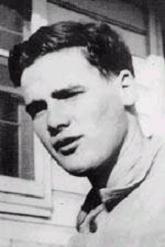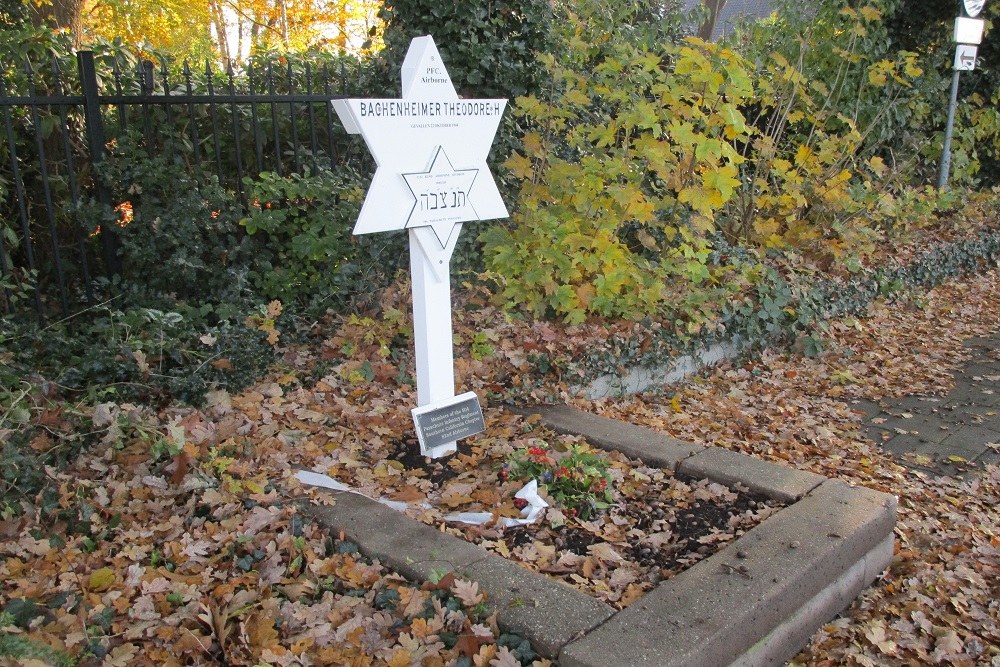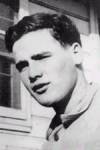Introduction by Frank van Lunteren
Many books and articles about the liberation of the Netherlands, or persons that have played an important part therein have been edited since the end of the Second World War. The American paratrooper Theodore “Ted” Bachenheimer was one of them.
After the Japanese attack on Pearl Harbor he enlisted in the American Army and he was drafted into the 504th Parachute Infantry Regiment. With this unit Bachenheimer was dropped over the Netherlands in September 1944.
Although many allied soldiers did not trust the Dutch resistance movement, Bachenheimer cooperated closely with them. Even far behind enemy lines… In 2001 James McNamara, son of a comrade of Bachenheimer, and myself started a search for the experiences of Ted Bachenheimer during the Second World War. This research was completed in October 2004 by my visit to his grave in Hollywood, California. A true odyssey had ended.
Especially for STIWOT [foundation for information on the Second World War] Egbert van de Schootbrugge has noted down the story of one of the most remarkable and well trained soldiers of the 504th Parachute Infantry Regiment. We sincerely hope that herewith the remembrance of Ted Bachenheimer will stay alive.
Frank van Lunteren,
Biographer of Ted Bachenheimer
 Klik hier voor de Nederlandstalige versie van dit artikel
Klik hier voor de Nederlandstalige versie van dit artikel
Definitielijst
- Infantry
- Foot soldiers of a given army.
- Regiment
- Part of a division. A division divided into a number of regiments. In the army traditionally the name of the major organised unit of one type of weapon.
- resistance
- Resistance against the enemy. Often also with armed resources.
Images
Theodore Bachenheimer (1923 – 1944)
Theodore (Ted) H. Bachenheimer was born on 23 April, 1923, in Braunschweig in Germany. His father was a pianist, a composer and opera producer; his mother was an actress. Both were of Jewish descent. Theodore was the eldest of two children. After Hitler’s conquering of power the Bachenheimers decided to emigrate.
The family ended up in France after traveling through Prague and Vienna in order to emigrate to the USA from there. Upon arrival his parents filed for American citizenship. The Bachenheimers established themselves in Hollywood, Cal.. Because of their profession they soon succeeded in finding employment in the theatre world. It was therefore no surprise that Theodore in 1941, when he was 18 years of age, registered as an Arts student at the Los Angeles City College.
On December 7th ,1941, the Japanese completely unexpected attacked the American naval base at Pearl Harbor in Hawaii. Consequently the United States declared war to Japan. Therefore Theodore Bachenheimer reported as a volunteer for military service early in 1942 with the recently established paratroops. Theodore completed the extremely heavy paratroopers training and obtained his parachuting certificate.
On May 1, 1942, the 504th Parachute Infantry Regiment had been established under the command of Colonel Reuben H. Tucker. Theodore was allocated to C Company of the 1st Batallion. At first his comrades asked themselves whether he was indeed able to serve as a paratrooper. He had youngish looks, dark curly hair and full blushing cheeks. He was soft spoken and his allover appearance was quiet and did not reflect to be one of a rough paratrooper. Behind this boyish appearance however an extremely strong will was hidden. Bachenheimer was dedicated to go and fight nazi-Germany, fed by his hatred against the national socialism. During this period also Bachenheimer’s father died.
In August 1942 Bachenheimer was transferred to Fort Bragg together with the whole of the 504th Parachute Infantry Regiment. This was due to the fact that the 504th was joined to the 82nd Airborne Division. Bachenheimer, who had held the German citizenship up till that moment, took the oath to obtain the American citizenship. Shortly before him leaving for Europe he married Ethel Murfield.
The 82nd crossed over to North Africa on April 29th, 1943. Eleven days later, May 10th they arrived in Casablanca, Morocco. There they spent two months in the desert with maneuvers and waiting. Early July 1943 the 82nd was transferred for their first battle jump over Sicily.
In the night of 9 to 10 July the 504th Parachute Infantry Regiment made its first battle jump. This jump turned out to be a disaster. The troops landed far and wide apart. This night it looked like Bachenheimer would have finished his war already. He landed in a German reinforced area and was made prisoner. He was held in a German command post. When he arrived there he could exactly follow what the Germans discussed, as German was his native language. The same night Bachenheimer escaped because of lack of attention of his guard. Arriving at his own lines, he told everything he had overheard.
During the remainder of the battle on Sicily, Bachenheimer demonstrated to be an excellent soldier. During the night he undertook to go on patrol on his own. Often these patrols were voluntary. During such patrols Bachenheimer acquired all kinds of information in various ways. He eavesdropped at German conversations or he sneaked close to a German trench or manhole and started a conversation in German with the respective soldier. As soon as he had collected sufficient information he drew his handgun and pointing at the stomach of the German soldier ordering him to come along. In case he refused, he killed him. In both cases he calmly returned to his own lines. At the end of the Sicily campaign Bachenheimer had gained the reputation of being a master scout.
In the night of 13 to 14 September, the 504th Parachute Infantry regiment jumped over Salerno. It was a reinforcement action of which the purpose was to remedy the allied situation in Salerno. Regarding the fighting in Salerno little is known about Bachenheimer; also because the 504th was already relieved on 20 September. Approximately a week after they had been relieved, on October 1st the 504th was involved in the capturing of the city of Naples which was heavily damaged. During the two and a half months afterwards the 504th was engaged as infantry in Mid-Italy.
Half way November Bachenheimer was on a patrol together with about fourteen of his comrades. Suddenly it appeared that they were surrounded by a group of heavily armed Germans. The lieutenant ordered Bachenheimer to go and get help. Bachenheimer reached their own lines and succeeded in returning just in time with required reinforcements. Unfortunately the lieutenant was killed during the heavy fighting that followed.
Bachenheimer participated with the 504th in the amphibious landings at Anzio on 22 January, 1944. During the first ten days in Anzio they were engaged in offensive actions, but during the last seven days this developed into a trench war. During that week Bachenheimer would grow to become a hero. In this period his reputation increased to superhuman proportions.
One night Bachenheimer and a companion, James McNamara, left their own lines covered by their own troops. The two sneaked around the enemy lines in a large arch, till they ended up behind the German machine-gun nest. Bachenheimer ordered McNamara to stay where he was. McNamara recalled after the war that Bachenheimer started to make a friendly conversation with the Germans. When the talking stopped after some time, McNamara heard the agreed signal and he approached Bachenheimer. He stood there quietly waiting for McNamara together with the German prisoner. With the prisoner between them they returned to Company C.
Another remarkable event was the following: Bachenheimer was on a patrol with three comrades. Arrived in no man’s land a Verey-light was fired, consequently the patrol was discovered and fired at by a machine gun. The three comrades who were of the opinion that their orders were to allocate the enemy, returned on their strides. Bachenheimer however, continued, all by himself in the direction of the enemy. For some minutes it was deadly quiet. Suddenly his comrades heard machine gun fire from the direction in which Bachenheimer had left.
When this was followed by another spell of quietness, the three were of the impression that Bachenheimer had been killed. Half an hour after they returned to their unit, the listening post reported by phone: “Bachenheimer just passed, dragging a German Sergeant with him.” The Feldwebel whom he had captured was livid, he had been taken up by a ‘youngster about ten years his junior’. According to reliable sources Bachenheimer roamed so often behind the enemy lines that he knew the names of the German company commanders and he knew where the medical aid stations and the stores were. In some cases he even knew whether a commander was a popular man with his troops or not.
The stories that circulated about Bachenheimer in those days amongst the 504th Parachute Infantry Regiment spread out about the 82nd Airborne Division and even further beyond. As the stories were told and retold, they became nicer and stronger. Therefore with hindsight it is difficult to distinguish truth from fiction. It happened that the one story lead to another one. One such story is the following: Bachenheimer sneaked during one of his ‘normal’ missions together with a mate, close to a German who was eating his sausage and potatoes. The German invited them both to join his meal. After they had talked for a while, Bachenheimer told the man that he ought to eat properly as it might take some time before he would enjoy his next meal. The German who became suspicious grabbed his weapon but was shot in his neck by Bachenheimer. Probably this was the basis of the story that Bachenheimer joined a German cue lined up for a meal. After he had finished his grub he returned to the 504th Parachute Infantry Regiment with the whole group of Germans.
The 504th Parachute Infantry Regiment left Anzio on 23 March, 1944, and joined the 82nd Airborne Division in Great Britain again. Bachenheimer was rewarded the Silver Star on 14 June, 1944, for demonstrated courage during the fighting for Anzio.
At the start of Operation Market Garden, Bachenheimer jumped at Overasselt. During the fighting in the Netherlands Bachenheimer became the most famous soldier of the whole 82nd Airborne Division. The mission of the Regiment was to capture the bridge across the river Meuse at Grave. On this first day Bachenheimer again showed his intrepidity. He participated in a patrol that crossed the bridge across the Meuse under enemy fire. The next day Bachenheimer advanced on his own. Soldiers of the 1st Batallion saw an American soldier on a bike riding towards Nijmegen. This paratrooper was Bachenheimer. After the soldiers had pointed out to him that Nijmegen was still occupied by the Germans, Bachenheimer answered: “Why, I don’t care! I am just going to have a look how things stand.” That was right at the moment that the Americans had withdrawn almost all forces in order to safeguard the dropping zones.
By the end of the afternoon Bachenheimer reported at the headquarters of the OD [Dutch resistance organization] Upon insisting by the commander of the OD, Bachenheimer took charge. Immediately he started to organize his group. He sent patrols into town, asked for intelligence, interrogated prisoners and submitted the information to his own headquarters. On September 19th, two days after the start of Operation Market Garden Bachenheimer agreed with the request of a number of Dutchmen, to clear the railway station of Germans. At 16:30 Bachenheimer arrived at the station accompanied by a Dutchman. The man in charge there was very much surprised: he had expected a much bigger force. The three of them conferred for a moment and created a plan. After they had searched a German train, they sneaked across to the second platform. There the loud speaker installation of the railway station was installed. The person who was in charge of the station switched the installation on and requested the German troops to surrender. Bachenheimer fired a round of his Thompson machine gun in front of the microphone in order to underline the request. Some forty Germans surrendered without striking a blow. The railway station was in allied hands. That same evening they had to give up their position as the Germans started a barrage on the station. When his companions of the 504th arrived in the city on September 20th, they found their comrade in his command post at the head of “his troops”. That afternoon he participated in an attack to cross the river Waal. For an unknown reason he returned however to his headquarters. With the assistance of two paratroopers he reopened some bakeries in order to provide food to the civilian population, he set up telephone lines and sent out patrols in order to gather information.
Bachenheimer was still Private First Class. Although he was offered the rank of Sergeant he refused. Major-General James Gavin, Commander of the82nd Airborne Division, has asked Lieutenant-Colonel Tucker what the reason was that such an excellent performer still held the rank of soldier. In September the papers for his promotion to Second Lieutenant have been submitted. He has never received this promotion though.
In the same period Bachenheimer was visited by Captain Peter Baker, a British Intelligence Officer. This Captain had understood from a member of the resistance movement that his group stood under the command of an American major. Together with his deputy, Pringle Dunn, he started to investigate this. Arriving at the headquarters they found Private First Class Bachenheimer. He explained the whole situation to them. Baker and Dunn were very impressed with his performance. Baker’s battalion under command of a Major was a unit that organized the escape and refuge of allied soldiers from enemy territory. After the Operation Market Garden, this unit generated two operations. Baker and Bachenheimer were involved in one of those operations: Operation Windmill. It was their job to set up the Windmill-line. That comprised that they had to develop a route for the allies to be used at withdrawal.
In the night of 11 to 12 October Baker crossed the river Waal at Tiel. One night later Bachenheimer followed while unwinding a telephone wire. Both found refuge with farmer Fekko Ebbens. Bachenheimer and Baker did not adhere to the strict conditions of operating in uniform all the time and to not leave their hiding place during the day. They walked in civilian clothes through the village. Probably a Dutch traitor has noticed this and betrayed them. Whatever happened, the farm of Ebbens had drawn the attention of the Sicherheitsdienst.
In the night of 16 October, the farm was surrounded and the Germans succeeded in entering by using a trick. They arrested ten people. Bachenheimer and Baker were arrested while sleeping. After their uniforms had been found they were separated from the others and carried off to Tiel. Early in the next morning they were transported with the other arrested people to a village near Den Bosch. Baker and Bachenheimer were interrogated for hours on end.
The two of them were transported on 18 October to a prisoner of war camp near Culemborg. From that camp they had to walk to a p.o.w. camp in Amersfoort. On 21 October 1944, they were carried to a camp in Fallingbostel. During this transport Bachenheimer escaped from the train together with three British paratroopers. Bachenheimer continued by his own. On the 22nd of October the Germans succeeded in catching Bachenheimer again. That night around 21:00 a truck of the Wehrmacht halted along the road the Eperweg in ‘t Harde. The inhabitants of the area heard two shots. And the next morning they found the body. It concerned Theodore H. Bachenheimer.
His comrades of the 504th did not know about this. In their view Bachenheimer had disappeared without leaving a trace when he crossed the Waal at Tiel. Forty years later a teacher from ‘t Harde exposed this matter. He identified Bachenheimer as a German Jew who had been murdered in his village.
Yet Bachenheimer remained a person with an unknown background to his own troops. Many did not know a thing or very little about his youth and background. Nobody knew how many Germans he had killed or imprisoned. Nobody knew whether he was nervous during his missions. Nobody was aware of how much he hated his enemies, who were once his compatriots. Many veterans have started the research the story behind this special paratrooper. Many asked themselves what had become of the man.
On 23 October 1944 Theodore H. Bachenheimer was buried at the Eekelenbug graveyard in Oldebroek. In April 1946 he was reburied at the American military cemetery in Neuville-en-Condroz in Belgium. Three years later Bachenheimer received a last resting place on the Beth Olam Jewish Cemetery in Hollywood Cal..
At the spot where Bachenheimer was executed, shortly after the war a memorial was erected. When it was discovered half way in the 80’s that he was a Jew, the memorial was changed and decorated with a Star of David.
Definitielijst
- Batallion
- Part of a regiment composed of several companies. In theory a batallion consists of 500-1,000 men.
- Infantry
- Foot soldiers of a given army.
- machine gun
- Machine gun, an automatic heavy quick firearm.
- Mid
- Military intelligence service.
- national socialism
- A political ideology drawn up by Hitler based on the superiority of the German race, the leader principle and fierce nationalism that was fed by the hard Peace of Versailles. National socialism was anti-democratic and racist. The doctrine was elaborated in Mein Kampf and organised in the NSDAP. From 1933 to 1945 National socialism was the basis of totalitarian Germany.
- nazi
- Abbreviation of a national socialist.
- offensive
- Attack on a smaller or larger scale.
- paratroopers
- Airborne Division. Military specialized in parachute landings.
- Regiment
- Part of a division. A division divided into a number of regiments. In the army traditionally the name of the major organised unit of one type of weapon.
- resistance
- Resistance against the enemy. Often also with armed resources.
- socialism
- Political ideology aiming at slight or no class differences. Means of production are owned by the state. Evolved as a response to capitalism. Karl Marx tried to substantiate socialism scientific.
- Wehrmacht
- German armed military forces, divided in ground forces, air force and navy.
Images
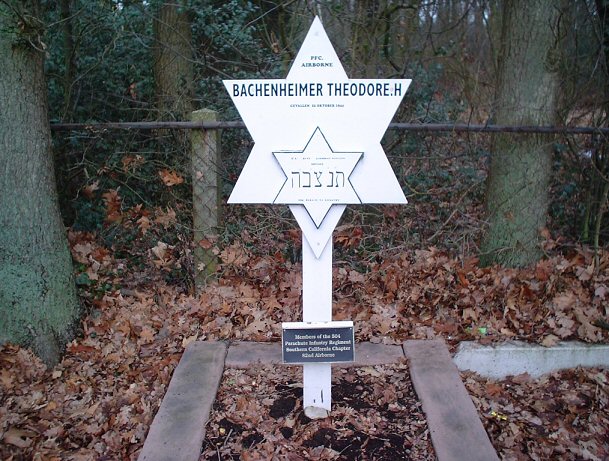 Monument in honor of Theodore H. Bachenheimer at the Eperweg in the village 't Harde. Source: Barry van Veen.
Monument in honor of Theodore H. Bachenheimer at the Eperweg in the village 't Harde. Source: Barry van Veen.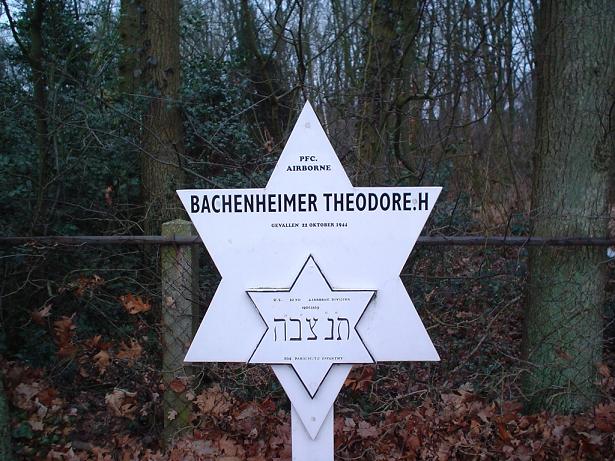 Close-up of the monument. Source: Barry van Veen.
Close-up of the monument. Source: Barry van Veen.Information
- Translated by:
- Fred Bolle
- Published on:
- 19-01-2025
- Feedback?
- Send it!
Related sights
Sources
- LUNTEREN, F. van, article in the newsletter of VVAM, Oosterbeek, Vrienden van het Airborne Museum, 2002.
Special thanks to Mr. Frank van Lunteren and Mr. James McNamara for their research and cooperation.
